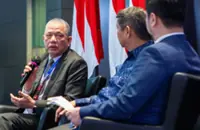JAKARTA, June 27 (Jakarta Post/ANN): The recent government crackdown on hardline Muslim mass organisation Khilafatul Muslimin, which is thought to have either funded or is affiliated with a number of educational institutions throughout the country, has sown fresh concerns over the threat of intolerant education in schools.
Authorities cracked down on the group, alleged to be looking to replace the state ideology of Pancasila with the caliphate, following a series of public outings by the group in Jakarta in late May.





